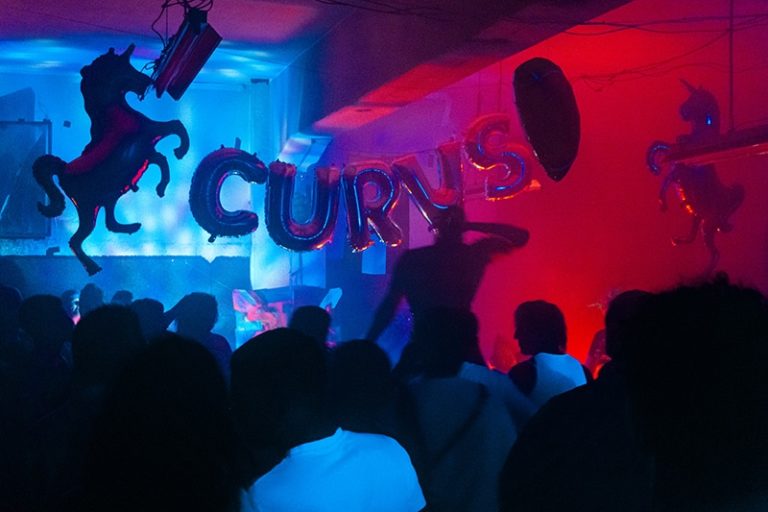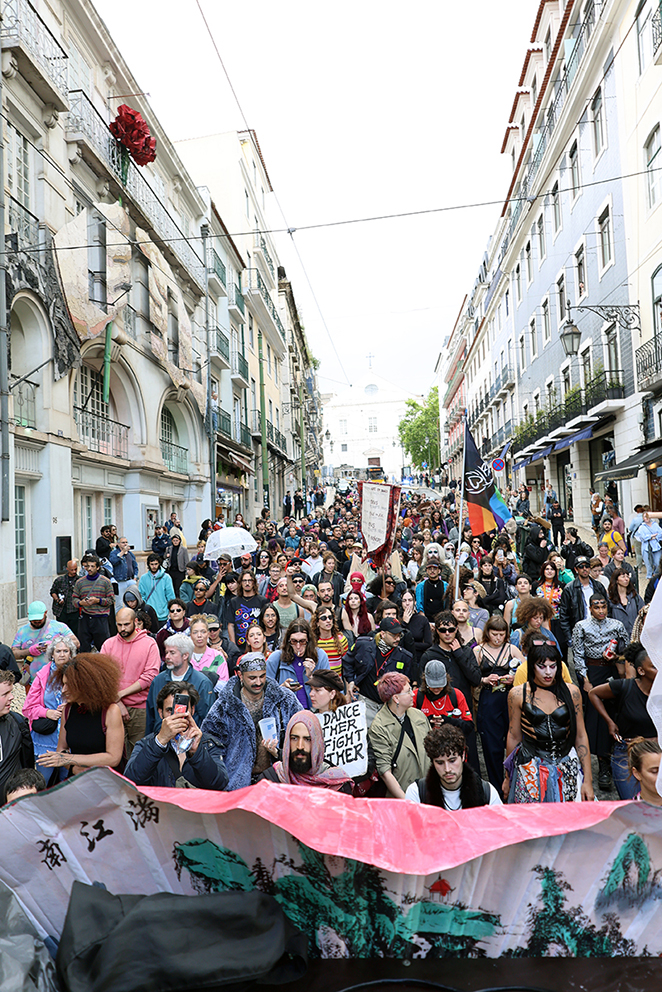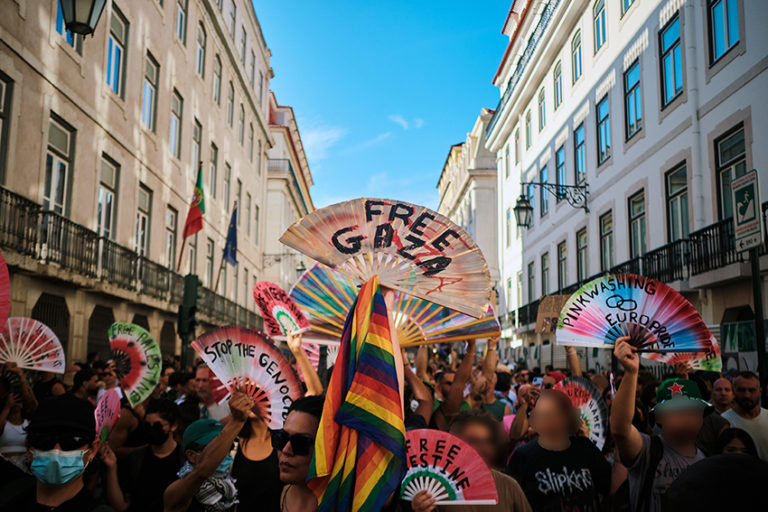This article is part of Reset! Yearly Focus 2025: Reclaiming Spaces
Author: Qravo Coletivo
In Lisbon’s underground club scene, the dancefloor is more than a place for celebration—it is a space of freedom, belonging, and resistance for marginalised queer communities. Yet, as police raids increasingly target spaces like Planeta Manas, the vulnerability and defiance embodied in dance become acts of political resistance. QRAVO Colletivo’s story illustrates how dancing together becomes a refusal of fear, a reclaiming of community, and a collective stand against the rising repression that seeks to control queer bodies and silence their resistance.

Live performance by L’Homme Statue at CURVS STILL PRIDE edition, September 2024 — © JONIRICOS
Imagine yourself dressed as you want, barely dressed, or even naked, on a dancefloor where you feel truly free. You’re dancing, enjoying yourself the way you want, kissing, hugging, and exchanging affection with whoever you connect with, vulnerable, present, without worry, fear, judgment, or armour. It’s so rare that you feel this safe. Then imagine that, at that very moment, dozens of armed police personnel, wearing helmets, invade this sacred space. They stop the music. They corner you and everyone around you. They laugh in your face. They make moralistic and stigmatising comments. They force you to leave.
Striking Reality
That’s exactly what happened in Lisbon, on February 8th, 2025. For the fourth time in five months, the police raids Planeta Manas, a queer-led cultural association that was home for underground, community-led raves, filled with dissident bodies and existences. Planeta Manas was hosting CURVS that night: a body/sex positive independent queer party, openly antifascist. Police raids targeted CURVS twice in a row. The PSP (Public Security Police) forced their way into Planeta Manas without a warrant—which is illegal for cultural associations—evacuated everyone, and carried out a so-called “inspection” that lasted more than three hours. Although other clubs in the area were also raided on one occasion, the operation only targeted Planeta Manas on all of the other occasions.
The police targeting our spaces and parties is a reminder of how threatening such spaces can be to systems of power. How the policing of queer bodies is tied to the policing of immigrants, racialised communities (not by chance, these operations in Planeta Manas were happening in sync with raids in neighbourhoods and squares with immigrant predominancy), and anyone who challenges the status quo. The raids on CURVS are not isolated incidents; they are part of a global rise in fascism, a desperate attempt by elites to maintain control as marginalised communities build escape routes from their oppressive systems. That shows the inherently intersectional aspect of queer struggles.
When the police finally left at 5:30 a.m., at least a quarter of the people who were at the party were still outside waiting in solidarity, hoping the space reopened once the PSP left. That moment revealed the strength and unity of our community around CURVS and Planeta Manas. The doors opened again, the party continued, and Gustrava, co-creator of CURVS and later QRAVO, promised the next CURVS would be a protest on the streets.

Demonstration in Lisboa, 2025 — © Qravo Coletivo
Hybrid Activism: Dancing and Protesting
That spontaneous announcement became an online open call, gathering more than 600 signatures and over 60 people for the first coordination meeting, where we started planning our protest-party march, “Fascism Persecutes - Our Dance Is Resistance”, on May 3rd, 2025 with the idea that if the police want to shut down the party, we’ll bring the party to the streets—reclaiming public spaces as our own. We marched and danced from Jardim do Príncipe Real to Praça do Município, denouncing police violence in Lisbon’s queer spaces.
It was a festive and artistic protest where political discourse happened not only through speeches, but also through music, dance, and performance. We had more participants than ever expected, with nearly one thousand people dancing and protesting in the rain, and a warm response from the streets. QRAVO was born.
By a joyful yet angry mix of party and riot, QRAVO was bringing a new hybrid aspect for activism in Portugal—partying can be a political act of resistance. The queerness of QRAVO was here to reframe how to fight back police violence. We had fans as signs, a catwalk over the faces of fascist world leaders, drag performers, dj sets, collective performances, and more.
After the protest, we decided to keep doing activism beyond the march—an activism that is queer, but necessarily intersectional with feminism, decoloniality, antizionism, antifascism, and anticapitalism at its core. That’s how QRAVO blossomed as a fully realised collective. The main inspiration was the protest itself, but also fuelled by the idea of imagining a “Queer 25th of April.[1]”
Claiming a Queer and Intersectional Vision
That idea emerged when, during the Torres Vedras Carnival (in the same month as the CURVS raid), an artistic monument displayed grotesque, caricatural figures of queers, lesbians, and trans people through a cis-hetero lens, accompanied by the question: “If the 25th of April were today, would this be our army?”. It mocked our community as if we were incapable of resistance. But that act gave us the perfect chance to reply: yes, this IS our army.
So QRAVO was born from that vision—a new 25th of April that is queer, feminist, anti-racist, anti-Zionist—an army ready to fight the new wave of fascism. The reply, 50 years later, to General Galvão de Melo's affirmation that the revolution was not made for the homosexuals' revindications[2].
QRAVO went back into the streets recently to fight the pinkwashing capitalist festival Europride, that happened in Lisbon this year and was led by Zionists. We disrupted the event with a coordinated fan-clacking performance, in which a group of 30 activists would clack their fans at the same time, each fan carrying messages for the liberation of Palestine like “From the river to the sea”, “No pride in Zionism”, “No pinkwashing,” etc. We danced with people who were protesting against Zionism, fascism, and capitalism. This was our way of drawing attention to the Palestinian cause and highlighting the links between the Portuguese organisers of the Europride and the Israeli government. This action happened as a part of several organised events, after the queer community joined forces to create one of the most successful boycotts happening in Portugal.
Our activism is literally by / with / for queer communities. QRAVO’s presence at Planeta Manas’ closing party for a political intervention around our use of zines, fans, and billboards is another example of these roots. Building an activist queer intersectional community is our essence, and we recognise and affirm that queer justice cannot be separated from feminism, anti-racism, anti-Zionism, housing justice, labour rights, drug policy, climate action, and anti-capitalist struggles.

Demonstration Euroshame, June 2025 — © Qravo Coletivo
Standing for Independent Spaces
Last but not least, QRAVO emerges at a time when many independent spaces are being suffocated, persecuted, and often forced to close. Gentrification has never been so devastating in Lisbon, transforming the city into a capitalist playground—after which fascism proceeds to criminalise the main victims of the process. The housing crisis impacts everyone, and with immigrants, BIPoC, and queers among the most vulnerable groups. QRAVO is trying to nurture bonds of solidarity between different communities and activists to fight back, to guarantee spaces where we all can survive, thrive, and be safe. Most of the “queer” venues in Lisbon operate primarily as businesses: with commercial logic, questionable work ethics, and little solidarity. When the police cracks down on independent spaces, most of these venues remain silent. So, we also fight to have independent spaces for queer communities that do not operate as businesses.
///
For our most recent actions, QRAVO joined Spoiler Room in response to the Boiler Room[3] event which happened in Lisbon, and co-organised an event to mark the Trans Day of Visibility on November 20th. We will also join several actions by other collectives as we deeply believe in intersectional articulation as a way to form coalitions that can convey a jarring truth: “minorities”, together, are the huge majority.
References
[1] April 25th, 1974 was the Portuguese revolution that marked the end of a 48-year fascist regime. The revolution’s symbol is the red carnation flower; “Cravo” in Portuguese. Qravo’s comes from this word, replacing the “C” with a “Q” for Queer.
[2] General Galvão de Melo was a Junta da Salvação Nacional member, a military group that temporarily took over the executive government after the revolution. At the time, there were 2 manifestos addressed to the government—the Manifesto for Gay Rights and the Manifesto for Sex Workers’ Rights. Galvão de Melo, in response, affirmed that the revolution was not made for “the whores and the faggots.”
[3] Boiler Room is owned by Superstruct Entertainment/KKR since 2025. KKR has alleged links to Israel, through business investments.
Published on November 25th, 2025